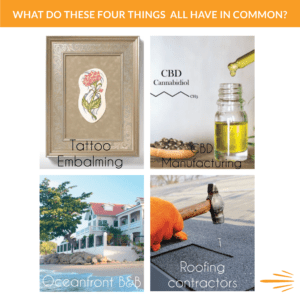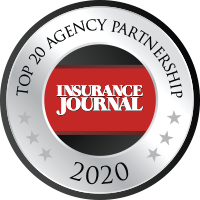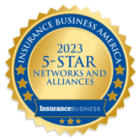Knowledge holds power. Have you ever heard a smile? You will hear that and so much more when listening to this episode. Carol Cole, assistant VP of Business Development at XS Brokers, explains what E&S really means and how a company can make this their business. She explains how to find the right wholesaler for you and even debunks the myth that non-brand name companies provide substandard coverage. For other Carriers that we work with click here.
Hard-to-place coverages that XS Brokers can place for you.
Edwin K. Morris (4s):
Welcome to the trusted advisor podcast brought to you by Iroquois group. Iroquois is your trusted advisor in all things insurance. I am Edwin K. Morris. Carol Cole is the assistant vice president of business development at Xs brokers and works out of the Philadelphia office. She also is the director of the social media team. Her experience in marketing and management includes commercial lines, personal lines, agriculture, professional liability, and flood programs. What is an ES line? ES? E&S? What is that?
Carol Cole (40s):
So E&S basically is the specialized part of the industry. And what we do is we place things that the standard market doesn’t want to insure. It can fluctuate a little bit, cause the standard market might change a little bit, but for the most part, it would be things like coastal property. It would be things like new ventures. So somebody wants to open up their own restaurant or a landscape, or for example, my landscaper, he worked for somebody else for many years. He decided to go out on his own. His kids could now drive so he could hire his children. And so he went out and started his own business. It could be environmental things with gas, oil, solar, things that are in high protection classes, protection class nines and tens, things, properties with losses, things like that.
Edwin K. Morris (1m 24s):
It sounds like it’s kind of in this speculation realm.
Carol Cole (1m 28s):
I don’t think it would be speculation per se. It’s basically the standard market. They kind of know what they like. And they like, I don’t want to say cookie cutter type things, but they like things that they know to do and where we have specialized underwriters who are trained to, to write those specialized risks. So we have people that go to seminars. Some of my underwriters they’ll go to the plus conference. They go to WSIA. So those are things like the professional lines underwriting society, the wholesale surplus industry associations, the underwriters get a lot of training. For example, I have an underwriter right now that she’s in the fourth month of her training. She does work with some agents a little bit, but she’s totally supervised nothing that goes out to an agent right now is not supervised and looked at before it goes out.
Carol Cole (2m 15s):
So that’s four months of training and she’s not even going out yet and talking to agents on her own. So we’re very, we’re very particular. And we want to make sure that we do it, do everything and do it right
Edwin K. Morris (2m 25s):
Well that leads into that idea then if it takes, if you just don’t walk in and start selling or working in this, this part of the industry, what’s licensing like? Do you, is there a special license?
Carol Cole (2m 38s):
So the retail agents, if they come to us, they do not need a special license. So they’ll just use their regular license. So any surplus lines licenses that are needed, the wholesaler such as mine will already take care of so we can handle all of that. So yeah, so the retail agent can just come to us as long as they’re licensed and in that particular state. So for example, every once in a while I do get somebody who will say, Hey, can I write in Florida? And if they have a license, they absolutely can write in Florida. But if they’re, let’s say a Pennsylvania agent and they don’t have a license in Florida, then I really should not be allowing them to place any Florida business with us, but they can just use their regular license.
Edwin K. Morris (3m 15s):
You gave a couple of examples of what that normally might be for, cases, anything that’s a kind of a crazy or really interesting situation that this would have been specifically sought out for?
Carol Cole (3m 30s):
In our office, we kind of have had a weird one lately. And when I tell agents, they kind of look at me with a funny face. We have a gentleman who, I guess he’s basically an embalmer and you know, everybody seems to have tattoos nowadays. So when people pass away, this gentleman will take the tattoo and he can create like a Memorial and then give it to the family members.
Edwin K. Morris (3m 53s):
Oh, wait a minute, wait a minute now, are you you kidding me?
Carol Cole (3m 58s):
Not kidding. We insured that. And I’m told the sales are doing really well. I just talked to my underwriter the other day and he said, yeah, he’s, the the sales are doing really well.
Edwin K. Morris (4m 12s):
Yeah. Hmm. Well that, that, that tops the level of interesting for sure. Whoa. So we’ve talked about the licensing. How long is the training program and how often does that have to be readdressed?
Carol Cole (4m 28s):
Well, and for agents, there’s really no training. Basically, for agents, what I do is I’m basically the relationship liaison between my company, the wholesaler and the, the agents. So basically what I do is I educate the agents on our appetite, but they don’t do any of the quoting. So they send everything into my team and my team does all of the quoting. So we have binding authority, we have binding authority underwriters. So basically in house, we would have the pen. So we actually act as the underwriter and companies give us the authority to actually bind on their behalf. So we have a host of companies that allow us to do that.
Carol Cole (5m 9s):
If for some reason, something comes into us and it can’t be bound in-house then we take it to our brokerage specialty team. And then what they’ll do is they’ll take it out to market. And when all that happens, basically we just then ship it back to the agent, say, Hey, this is what we think is the best option for you. What do you think? And then there’s some back and forth too. Sometimes agents will say, Hey, I don’t really need the Cadillac of coverage. We had one a while back, the agent came back and he said, Hey, I don’t, I don’t need these three coverages. Can you take them off and then I could save my insured a little bit of money.
Edwin K. Morris (5m 41s):
How does that agent find you?
Carol Cole (5m 43s):
So basically if an agent’s looking for a wholesaler, I would contact your Big I, the PIA, you could ask your standard marketing reps, look on LinkedIn, ask fellow agents, you know, who are you having good success with? I know we’re at a lot of conventions like myself, for example, I’ll be going to Pittsburgh I-Day. In about three months, I’ll also be doing the PIA of New York, New Jersey in Atlantic city. So I’ll have a booth. And then I personally post on LinkedIn quite a bit too, both for Xs brokers, as well as for my own personal page too. So it’s usually pretty easy for an agent to find a wholesaler. They just have to find somebody that’s a good fit for them.
Edwin K. Morris (6m 20s):
Is there a bit of a myth of this being a substandard coverage?
Carol Cole (6m 24s):
Well, I think that if an agent hasn’t heard of a particular company, sometimes then they think right away it’s non-standard or substandard. So I had an agent a while back who called and he said, Hey, Carol, I’m looking for some high value homeowner’s, do you have any options? And I said, yes, I do. And he asked some of the companies. So when I told them the companies, they weren’t companies he had heard of, they didn’t have big fancy ads on TV. So right away he made the assumption that it was substandard coverage. And I said, Oh absolutely. I said, nothing could be further from the truth. And in fact, even in certain realms, for example, sometimes our standard or our admitted care, or sometimes we’ll offer things like vacant property. For example, they might offer something on an actual cash value basis, which includes depreciation.
Carol Cole (7m 9s):
They might just put it on a basic form where my team, we can put it on a replacement cost. We can put it on special form, which would give you water damage, would include weight of snow or ice. So a lot of times we can sometimes do just as good, if not better sometimes than what the standard market actually offers for, for those lines that we really are comfortable with and we really like, and our, and our carriers really like as well.
Edwin K. Morris (7m 33s):
Where do you find that, so that’s a relationship understanding that you have just through experience and you’ve, you’ve dealt with these organizations that say, most people didn’t know, they were like your, in your example, they didn’t know about those companies. How do you check the financial stability of large E&S carriers?
Carol Cole (7m 52s):
There’s AM best, and that’s a rating company and they look at the financial stability. They look at our catastrophic exposures, you know, how much business do we have in Florida or California and how much is there? So for example, Lloyd’s of London has been around since 1688, they have 54 billion in assets. Scottsdale’s another company A-plus rated, 157 billion, and that’s a billion with a B, in assets owned by nationwide. Penn America’s another company that we use A-rated, they trade on the NASDAQ. So some of these companies are, are huge. In fact, sometimes again, sometimes they’re bigger than some of the standard companies, mutual companies that sometimes our retail agents are using.
Edwin K. Morris (8m 38s):
Where is the future for you?
Carol Cole (8m 40s):
For E&S or for me personally?
Edwin K. Morris (8m 45s):
Yes
Carol Cole (8m 46s):
Well, I actually love the, personally, I love the E&S side of the business. I did start out more on the non-standard or standard side, the business. And so I worked for an E&S carrier for about eight years before I jumped over to Xs brokers. And, and I actually love it. It was funny. I was actually traveling with an Iroquois marketing manager last year and he traveled with me and we were sitting and talking to some agents and he goes, Oh my gosh. He’s like, I love your job. He’s like, you say yes to almost everything. And I’ll be honest. We don’t write everything. I do have a couple of things that we, we don’t write. For example, my company, we just don’t write any primary auto, that’s just not a line that we’ve wanted to get into.
Carol Cole (9m 29s):
So I do turn that away, but, but 99 times out of a hundred, I usually can try to find a market for somebody. So it is kind of nice. I do say yes pretty often, more so than when I worked in the standard market. So that is nice. And then for our company, we’re about a $210 million company. Got eight offices and we’re continuing to grow. We’re second generation family run. So we’re super excited about the future of E&S and, you know, the future growth that we have coming up.
Edwin K. Morris (9m 59s):
Well that is all very exciting, and I’m glad to see you smile when you say that, because you can tell that that joy, that happiness, that what you get out of this is very important to you. Thank you for sharing your experience today.
Carol Cole (10m 14s):
Thank you for having me. It was great to be here.
Edwin K. Morris (10m 18s):
Thanks for listening to this edition of the trusted advisor podcast brought to you by Iroquois group. Iroquois, your trusted advisor for all things insurance, and remember get out of the office and sell. This program was recorded live at the Cohen multimedia studio on the grounds of Chautauqua institution. I am Edwin K. Morris, and I invite you to join me for the next edition of the trusted advisor podcast.



